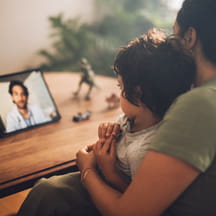For children's hospitals, having access to the latest technology—especially in emergency situations—can save lives. But Children's Hospital & Medical Center in Omaha, Nebraska, is improving outcomes for emergency department (ED) patients in suicidal crises with a low-tech solution: handwritten follow-up notes.
"This program is reaching out and letting (recently discharged) patients know they have someone who's thinking about them, advocating for them and supporting them," says Zebulon Timmons, M.D., division chief of pediatric emergency medicine. "It lets these kids know someone cares about them, and it helps them out of the isolation that naturally happens with mental health disorders—it's powerful."
Personalized notes leave a positive impression
Children's Omaha launched Caring Contacts last spring after one of the hospital's social workers, Sabrina Schalley, shared an article citing research showing lower suicide rates among adults who had received letters from care providers following a suicide attempt. It's believed to be the first program of its kind for teens and adolescents experiencing suicidal thoughts or actions.
The concept is straightforward: each patient, with a guardian's permission, receives six handwritten notes over the year following their ED visit from the social worker who completed their assessment and assisted in treatment planning.
Although Schalley and her team include some standard language in the notes, each is personalized specifically for the patient—often referencing hobbies or interests discussed during their hospital visit.
For a generation of teens and adolescents raised in a digital age, this show of support takes on added significance. "We have heard from some of the adults in the kids' lives that they keep all of the cards and put them in their drawer or a special place," says Schalley, LCSW, social work manager. "We like the idea that it is a tangible thing the kids can hold on to, and it's not lost in their tech stream."
Qualitative and anecdotal evidence back program's value
Research shows the follow-up notes—in conjunction with ongoing treatment prescribed by the patient's care team at discharge—are effective in preventing future suicides in adults.
Children's Omaha is seeing similar results; since the launch of Caring Contacts, Schalley says she's not aware of any of her team's patients committing suicide. Additionally, only 17% have experienced a repeat incidence of suicide ideation—compared to a 27% rate of repeat suicide attempts among teens and adolescents nationally, according to a 2018 study.
Beyond the numbers, Schalley and her team can see the program's effect from the responses they receive from former patients. "They tell us they felt heard in that moment (while in the ED), tell us about the struggles they may be having and that they're happy to continue working through it," says Trisha Graeve, LCSW, medical social worker. "We've had patients tell us we saved their life—the responses are touching."



